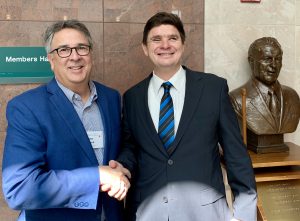 The COVID-19 Pandemic is devastating the United States. As at 16 November there are over 10.6 million confirmed infections and almost a quarter of a million deaths in the US. While public health interventions are critical to saving lives, the Burton Blatt Institute has been funded to interrogate what COVID-19 health surveillance measures means for persons with disabilities and ability diversity.
The COVID-19 Pandemic is devastating the United States. As at 16 November there are over 10.6 million confirmed infections and almost a quarter of a million deaths in the US. While public health interventions are critical to saving lives, the Burton Blatt Institute has been funded to interrogate what COVID-19 health surveillance measures means for persons with disabilities and ability diversity.
International Distinguished Fellow, Associate Professor Paul Harpur, from the University of Queensland Law School, and BBI Chairman Professor Peter Blanck have been awarded a Social Science Research Council Just Tech Covid-19 Rapid-Response Grant. Their Social Science Research Fellowship are supported with funds from the Ford Foundation and the MacArthur Foundation.
Their project, “The Unsettling of Old Norms by a New World of COVID-19 Public Health Surveillance”, will ask:
- How has COVID-19 public health surveillance shifted social norms pertaining to health status in public spaces?
- How are the new health norms created by COVID-19 health surveillance creating new sites of disablement in society?
- Whether or not disabled groups wish to claim the mantle of disability, how does disability discrimination and ability equality measures apply to people disabled by COVID-19 health surveillance?
- How can this unsettling of able and disabled be used to help mainstream ability equality and make a more inclusive society?
Harpur and Blanck explain that the disabling impact caused by the introduction of COVID-19 public health surveillance has rapidly emerged and is profound for individuals and their families.
Almost overnight, there has been a massive reduction in the capacity of people with certain medical conditions to be in public spaces. Certain medical conditions attract the attention of public health surveillance systems and/or their human operators. While a medical practitioner might understand the condition, the tens of thousands of people hired and deployed to implement public health surveillance measures may lack the qualifications to understand complex disabilities and how to appropriately respond.
Overnight, conditions that were regarded by society as within the normal range of abilities are now regarded as unacceptable. For people who were not previously regarded as disabled, but who are now disabled by COVID-19 health surveillance, the impact on their lives will be profound. With the individual, their families and friends being unaccustomed to managing social exclusion, this could result in major social disruptions.
Interrogating what the full impact of COVID-19 health surveillance has upon ability diversity will be an on-going project lasting decades. It is urgent to ensure that the framing and responses to new disablement reflects the gains made by the disability rights movement.